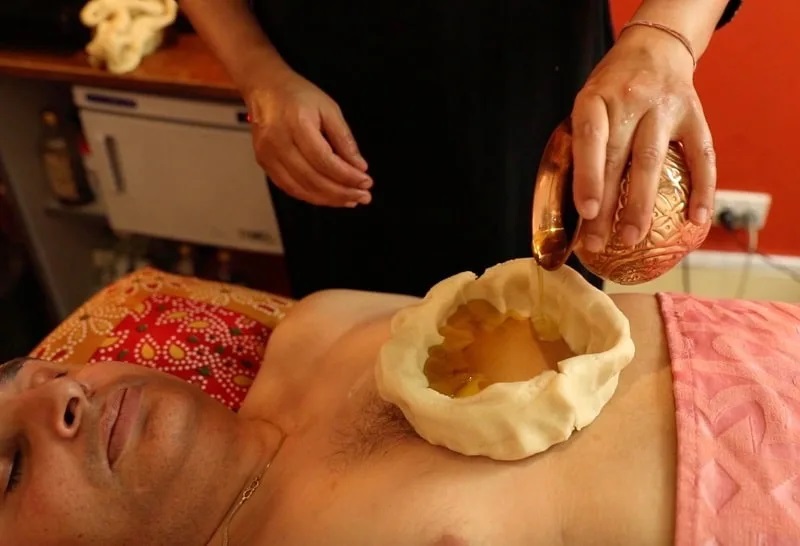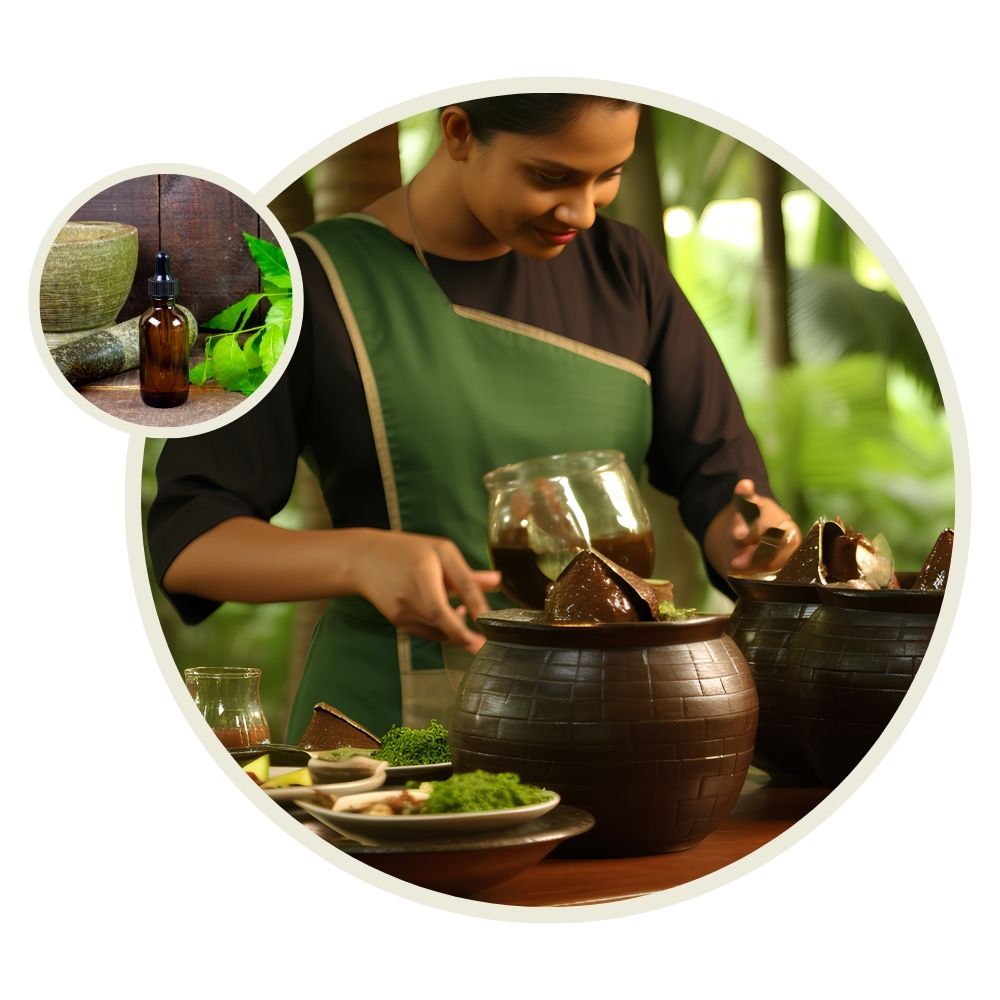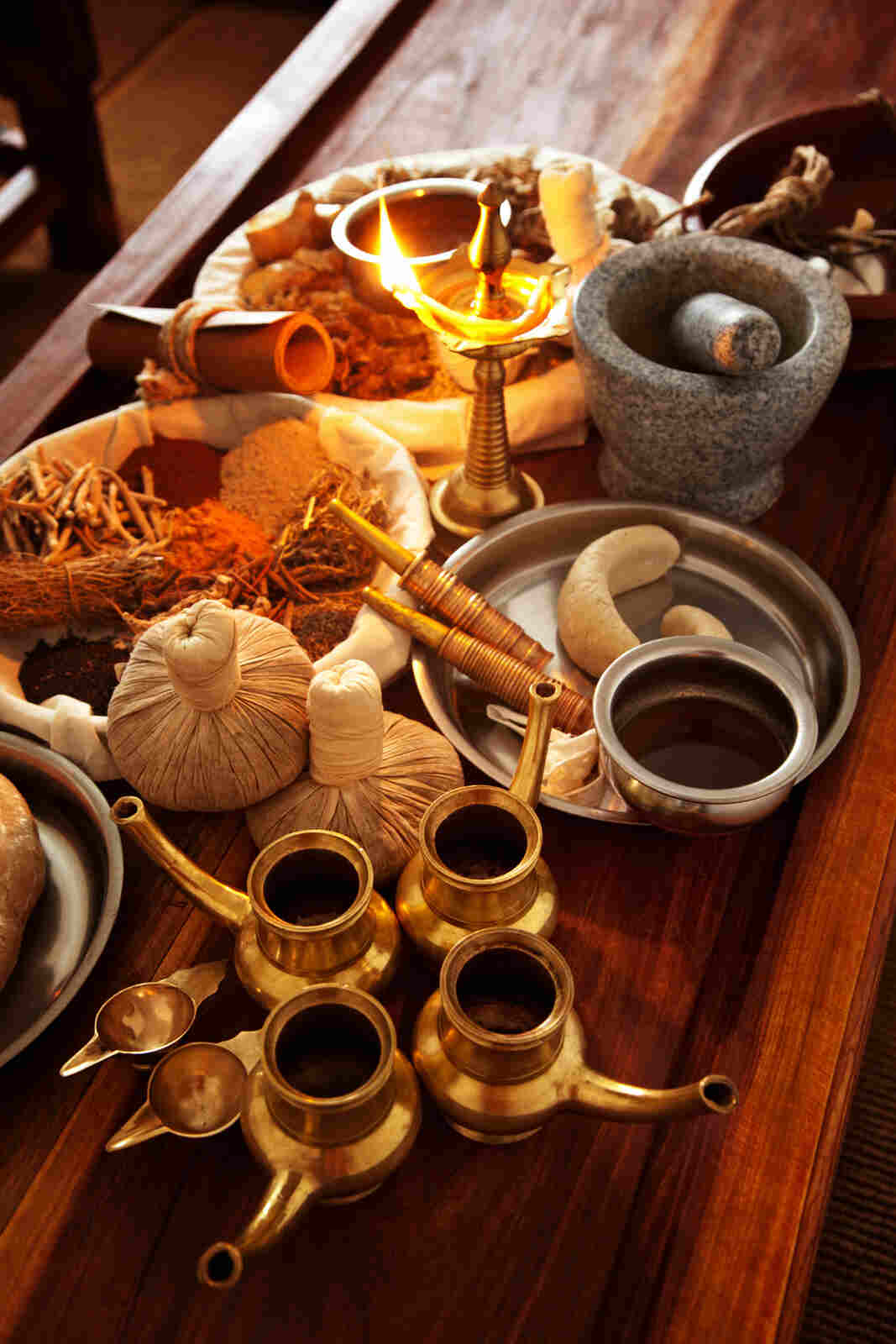Ayurveda Treatment for GERD
( Gastroesophageal reflux disease )
Niroga Ayurveda Healing ( Ayurveda Chikitsa / Treatments )
What is Gastroesophageal Reflux Disease (GERD)?


Why Choose Ayurveda for GERD?
Ayurveda offers holistic and natural treatment options for GERD that focus on balancing the body’s doshas and enhancing digestive health without the side effects of conventional medications. Ayurveda treats the root cause rather than just the symptoms, ensuring long-term relief and improved overall health.
Statistics: GERD in Hyderabad, India, and Globally
- Hyderabad, India: Approximately 20% of the population suffers from GERD, reflecting a growing trend due to lifestyle changes.
- Globally: GERD affects about 15-30% of the general population, with a higher prevalence in Western countries.
Who is Frequently Affected by GERD?
GERD commonly affects adults but can also occur in children. Risk factors include obesity, pregnancy, smoking, and consuming certain foods and beverages.
Detailed Causes of Gastroesophageal Reflux Disease (GERD)
Dietary Factors
Spicy Foods: Foods with high spice content can irritate the lining of the esophagus and trigger acid reflux.
Fatty Foods: High-fat foods like fried items and certain cuts of meat relax the lower esophageal sphincter (LES), allowing stomach acid to flow back into the esophagus.
Citrus Fruits: Oranges, lemons, and grapefruits are highly acidic and can cause heartburn and acid reflux.


Tomato-Based Products: Tomatoes and sauces made from them are highly acidic and can aggravate GERD symptoms.
Chocolate: Contains caffeine and theobromine, both of which can relax the LES.
Mint: Peppermint and spearmint relax the LES, making it easier for stomach acid to flow back into the esophagus.
Alcohol: Alcohol relaxes the LES and increases stomach acid production.
Caffeinated Beverages: Coffee, tea, and sodas contain caffeine, which can relax the LES and increase acid production.
Carbonated Drinks: The bubbles in these drinks can cause burping, which can push stomach acid into the esophagus.
Lifestyle Factors for GERD
- Obesity: Excess weight increases pressure on the abdomen, pushing stomach contents into the esophagus.
- Smoking: Nicotine relaxes the LES and stimulates stomach acid production.
- Pregnancy: Hormonal changes and increased pressure on the stomach from the growing fetus can lead to GERD.
- Eating Large Meals: Consuming large meals increases stomach pressure and the likelihood of acid reflux.
- Lying Down After Eating: When you lie down, it’s easier for stomach contents to flow back into the esophagus.
- Eating Before Bed: Eating close to bedtime can cause nighttime reflux, as lying down exacerbates the problem.
- Wearing Tight Clothing: Tight belts or clothes around the waist can put pressure on the abdomen, forcing acid into the esophagus.


Medical Conditions
- Hiatal Hernia: A condition where part of the stomach pushes through the diaphragm into the chest cavity, weakening the LES and facilitating reflux.
- Gastroparesis: Delayed stomach emptying increases the risk of acid reflux.
- Connective Tissue Disorders: Conditions like scleroderma can weaken the LES.
Medications
- Nonsteroidal Anti-Inflammatory Drugs (NSAIDs): These can irritate the esophagus lining and increase acid production.
- Calcium Channel Blockers: Used for high blood pressure, they can relax the LES.
- Antidepressants: Certain antidepressants can relax the LES.
- Progestin: Found in birth control pills and hormone replacement therapy, it can relax the LES.
- Sedatives: Can relax the LES and decrease esophageal motility.
Often, GERD is caused by a combination of the above factors. For example, a person who is overweight, smokes, and consumes a diet high in fatty and acidic foods is at a higher risk of developing GERD. Addressing these factors through lifestyle changes, dietary adjustments, and medical treatment can help manage and reduce GERD symptoms effectively.
GERD Prevention and Management
- Maintain a Healthy Weight: Reduces pressure on the stomach.
- Eat Smaller Meals: Less pressure on the LES.
- Avoid Trigger Foods: Identify and eliminate foods that cause symptoms.
- Quit Smoking: Improves LES function and reduces acid production.
- Avoid Alcohol: Reduces LES relaxation and acid production.
- Stay Upright After Eating: Prevents reflux.
- Elevate the Head of Your Bed: Reduces nighttime symptoms.
GERD Aetiology
GERD occurs when the lower esophageal sphincter (LES) weakens or relaxes abnormally, allowing stomach acid to flow back into the esophagus.
GERD Symptoms and Signs:
Heartburn: A burning sensation in the chest, usually after eating, which might be worse at night or when lying down.
Regurgitation: The sensation of acid backing up into your throat or mouth, producing a sour or bitter taste.
Chest Pain: Discomfort or pain in the chest, often mistaken for a heart attack, especially after eating.
Difficulty Swallowing: Also known as dysphagia, this involves a feeling of food being stuck in the throat or chest.
Chronic Cough: A persistent cough that doesn’t seem to go away and is often worse at night.
Hoarseness: A raspy or strained voice, particularly in the morning, due to acid irritating the vocal cords.
Diagnosis for GERD:
- Clinical Evaluation: Patient history and physical examination
- Diagnostic Tests: Endoscopy, pH monitoring, esophageal manometry, barium swallow
Types of GERD:
Erosive GERD
Characterized by visible damage to the esophagus lining due to stomach acid, often confirmed through endoscopy.
Non-Erosive GERD (NERD)
No visible esophageal damage is seen during endoscopy, but patients experience persistent GERD symptoms such as heartburn and regurgitation.
Understanding the types of GERD helps in choosing the appropriate treatment plan. For personalized Ayurvedic treatments, visit Sai Ayush Ayurveda Hospitals.
Home Remedies for GERD
- Ginger Tea:
Ginger has anti-inflammatory properties that help soothe the digestive tract.
Preparation: Boil fresh ginger slices in water, strain, and drink.
- Aloe Vera Juice:
Soothes the esophagus lining and reduces acidity.
Dosage: Drink 1/4 cup of aloe vera juice 20 minutes before meals.
- Chewing Gum:
Increases saliva production, which can help neutralize stomach acid.
Usage: Chew sugar-free gum for 30 minutes after meals.
- Baking Soda:
A natural antacid that neutralizes stomach acid.
Dosage: Mix 1/2 teaspoon of baking soda in a glass of water and drink.
Ayurvedic Treatment Options for GERD
Ayurveda offers a holistic approach to managing Gastroesophageal Reflux Disease (GERD) by addressing the root causes and providing natural remedies that promote overall digestive health. The treatments aim to balance the doshas, particularly Pitta dosha, which is often associated with digestive issues. Below are detailed Ayurvedic treatment options for GERD:
Pitta-Pacifying Diet:
- Cooling Foods: Include cooling and alkaline foods such as cucumber, leafy greens, and coconut water.
- Avoid Spicy and Acidic Foods: Reduce or eliminate spicy, fried, and acidic foods like tomatoes, citrus fruits, and vinegar.
- Moderate Protein: Include easily digestible proteins like lentils and legumes.
- Eat Small, Frequent Meals: Avoid overeating and consume smaller meals more frequently to reduce pressure on the LES.
Hydration:
- Drink plenty of water throughout the day to help neutralize stomach acid.
- Avoid caffeinated and carbonated beverages that can exacerbate symptoms.
Herbal Remedies
- Triphala:
- A blend of three fruits (Amalaki, Bibhitaki, and Haritaki) that aids digestion and helps regulate bowel movements.
- Dosage: Typically taken as a powder mixed with warm water before bed.
- Soothes and heals the esophagus lining and reduces acid production.
- Dosage: Can be taken as a tea or in capsule form.
- Rich in Vitamin C, it reduces acidity and promotes healing of the digestive tract.
- Dosage: Consumed fresh, as juice, or in powdered form.
- Helps in digestion and reduces bloating.
- Dosage: Chew a teaspoon of fennel seeds after meals or drink fennel tea.
Lifestyle Modifications for GERD
- Stress Management:
- Practice meditation, deep breathing exercises, and yoga to reduce stress, which can exacerbate GERD symptoms.
- Techniques like Shavasana (Corpse Pose) and Anulom Vilom (Alternate Nostril Breathing) are particularly beneficial.
- Eat in a calm environment, chew food thoroughly, and avoid lying down immediately after meals.
- Maintain a gap of at least 2-3 hours between dinner and bedtime.
- Obesity can increase abdominal pressure, exacerbating GERD symptoms. Engage in regular physical activity and maintain a balanced diet.
Panchakarma Therapies for GERD
Virechana (Purgation Therapy):
A detoxification procedure that helps eliminate excess Pitta from the body.
Administered under the supervision of an Ayurvedic practitioner, it involves the use of herbal purgatives.
Basti (Medicated Enemas):
Helps cleanse the colon and regulate digestive health.
Types of Basti for GERD include Anuvasana Basti (oil enema) and Niruha Basti (decoction enema).
Yoga for GERD
Kapalbhati Pranayama (Skull Shining Breath):
Enhances digestion and detoxifies the body.
Practice: Perform in the morning on an empty stomach.
Bhujangasana (Cobra Pose):
Strengthens the esophagus and stomach muscles.
Practice: Hold the pose for 15-30 seconds and repeat 3-5 times.
Vajrasana (Diamond Pose):
Aids in digestion when done immediately after meals.
Practice: Sit in this pose for 5-10 minutes after eating.
Ayurvedic treatments for GERD at Sai Ayush Ayurveda Hospitals focus on natural and holistic approaches to manage and reduce symptoms effectively. By incorporating dietary and lifestyle modifications, herbal remedies, Panchakarma therapies, and yoga, patients can achieve lasting relief and improved digestive health. For personalized treatment plans and consultations, visit Sai Ayush Ayurveda Hospitals.
FAQs
Frequently Asked Questions
What is GERD and how is it treated in Ayurveda?
A:Ayurveda treats GERD by balancing the doshas, particularly Pitta, using herbal remedies, dietary modifications, and Panchakarma therapies to provide long-term relief.
Are Ayurvedic treatments for GERD effective?
A:Yes, Ayurvedic treatments are effective in managing GERD by addressing the root cause and providing holistic care, ensuring no side effects.
Can diet and lifestyle changes help with GERD?
A:Absolutely. Ayurvedic diet and lifestyle modifications play a crucial role in managing GERD symptoms and improving digestive health.
What are the common symptoms of GERD?
A:Common symptoms include heartburn, regurgitation, chest pain, difficulty swallowing, chronic cough, and hoarseness.
How can yoga help in managing GERD?
A:Yoga helps improve digestion and reduce stress, both of which are essential in managing GERD effectively.
Fill out this form for booking online.
Appointment
Book An Appointment
Make sure to note down the appointment date, time, and location provided by the clinic. Set reminders on your calendar or set an alarm to ensure you are punctual and do not miss your appointment.
Customer Service
+91 84668 82266
WhatsApp Now
+91 84668 82266
Subscribe Now
SaiAyush Ayurveda

